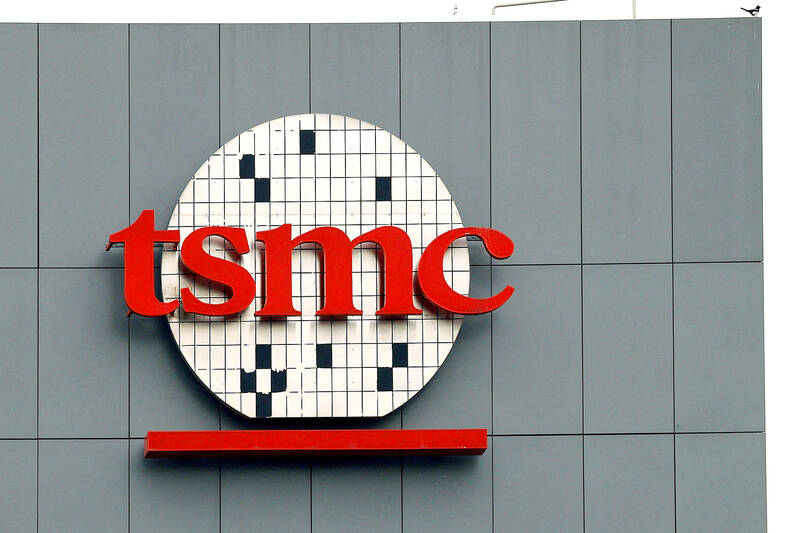Taiwan Semiconductor Manufacturing Co (TSMC, 台積電) senior vice president of business development Kevin Zhang (張曉強) told reporters yesterday that talks over a possible plant in Germany are continuing and that the earliest decision would be in August.
“I don’t want to get into the politics side of the thing, but I do think that there is a need for us to provide our customers with a diverse supply,” Zhang said, adding that Europe is a “very significant geography given the customer base ... [and] the demand.”
Zhang did not confirm the size of subsidy or cost of the potential project or which companies might be participating.

Photo: Ann Wang, Reuters
A spokesperson for the German Ministry for Economic Affairs and Climate Action confirmed that talks with TSMC were ongoing, but did not provide details.
Earlier this month it was reported that the Taiwanese chipmaker was in talks with partners to invest as much as 10 billion euros (US$10.8 billion) to build a chip fab in Germany.
Although semiconductor fabs’ costs vary according to capacity, chip type and country, the industry is one of the most capital-intensive, requiring construction of clean rooms and purchase of sophisticated manufacturing tools. Samsung Electronics Co, for example, spent about 60 trillion won (US$45.4 billion) to build two plants in Pyeongtaek, South Korea.
However, China’s ban on the use of US-based Micron Technology Inc’s chips in certain sectors, announced on Sunday, is a stark reminder of risks facing the global chip industry as it braces for escalating Sino-US trade tensions.
Micron, which makes DRAM and NAND flash memory chips, is the first US chipmaker to be targeted by Beijing after Washington over the past year unveiled a series of export controls to block certain chips and chipmaking technologies being used to advance China’s military capabilities.
While the move could benefit Micron’s key rivals — South Korea’s Samsung and SK Hynix Inc — in the near term, analysts said the growing geopolitical tensions cast a shadow over the industry, as companies need to navigate rising uncertainties that could impact investment and supply chain management.
“It takes huge amounts of pre-emptive investment to be a chipmaker, and it takes five years, 10 years to break even on those investments, so putting predictability into jeopardy makes investments difficult,” Korea Semiconductor Industry Association vice chairman Lee Chang-han said. “In the long term, this won’t help anybody.”

PROTECTION: The investigation, which takes aim at exporters such as Canada, Germany and Brazil, came days after Trump unveiled tariff hikes on steel and aluminum products US President Donald Trump on Saturday ordered a probe into potential tariffs on lumber imports — a move threatening to stoke trade tensions — while also pushing for a domestic supply boost. Trump signed an executive order instructing US Secretary of Commerce Howard Lutnick to begin an investigation “to determine the effects on the national security of imports of timber, lumber and their derivative products.” The study might result in new tariffs being imposed, which would pile on top of existing levies. The investigation takes aim at exporters like Canada, Germany and Brazil, with White House officials earlier accusing these economies of

EARLY TALKS: Measures under consideration include convincing allies to match US curbs, further restricting exports of AI chips or GPUs, and blocking Chinese investments US President Donald Trump’s administration is sketching out tougher versions of US semiconductor curbs and pressuring key allies to escalate their restrictions on China’s chip industry, an early indication the new US president plans to expand efforts that began under former US president Joe Biden to limit Beijing’s technological prowess. Trump officials recently met with their Japanese and Dutch counterparts about restricting Tokyo Electron Ltd and ASML Holding NV engineers from maintaining semiconductor gear in China, people familiar with the matter said. The aim, which was also a priority for Biden, is to see key allies match China curbs the US

Teleperformance SE, the largest call-center operator in the world, is rolling out an artificial intelligence (AI) system that softens English-speaking Indian workers’ accents in real time in a move the company claims would make them more understandable. The technology, called accent translation, coupled with background noise cancelation, is being deployed in call centers in India, where workers provide customer support to some of Teleperformance’s international clients. The company provides outsourced customer support and content moderation to global companies including Apple Inc, ByteDance Ltd’s (字節跳動) TikTok and Samsung Electronics Co Ltd. “When you have an Indian agent on the line, sometimes it’s hard

‘SACRED MOUNTAIN’: The chipmaker can form joint ventures abroad, except in China, but like other firms, it needs government approval for large investments Taiwan Semiconductor Manufacturing Co (TSMC, 台積電) needs government permission for any overseas joint ventures (JVs), but there are no restrictions on making the most advanced chips overseas other than for China, Minister of Economic Affairs J.W. Kuo (郭智輝) said yesterday. US media have said that TSMC, the world’s largest contract chipmaker and a major supplier to companies such as Apple Inc and Nvidia Corp, has been in talks for a stake in Intel Corp. Neither company has confirmed the talks, but US President Donald Trump has accused Taiwan of taking away the US’ semiconductor business and said he wants the industry back